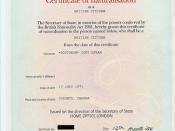In ancient Athenian society, citizenship and the exclusivity thereof was key to the function and operation of the radical democracy. Very few residents of Athens were actually full citizens; social status was divided into several groups in order to maintain the government. Both Athenian citizens and foreigners alike admired the Athenian democracy. As Thucydides recorded of Pericles' Funeral Oration, "Our government does not copy our neighbour, but is an example to them." The different main social classes consisted of the metics (foreign residents), slaves, women and citizens. Within each group there were several smaller classes. Citizens in the classical period were Athenian born adult males, with both Athenian parents, who had registered with their deme at the age of 18.
Male citizens received many privileges as a birthright. They were the only group that had full political rights such as attending, speaking and voting in assemblies and serving in the government of the polis, were free of the tax that metics were required to pay, had the right to own land, could bring prosecutions and defend themselves in court and could serve on juries.
Citizens were separated into four classes according to their wealth. The pentakosiomedimnoi were the richest citizens and most likely came from old aristocratic families. The hippeis, or zeugitai were the next wealthiest class, followed by the hoplites, who were the middle class. The thetes were the lowest class. Any citizen could serve in the government or on the jury, as lot chose most political positions. The only two positions that were elected by lot were the strategoi and the archons. Most citizens in government were the richer, well-educated citizens who lived in the city near where the ecclesia met. These citizens were also the ones who attended the ecclesia often, as the poorer farming citizens...


